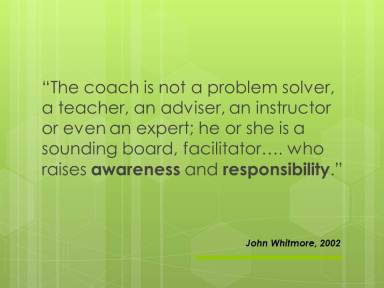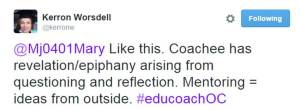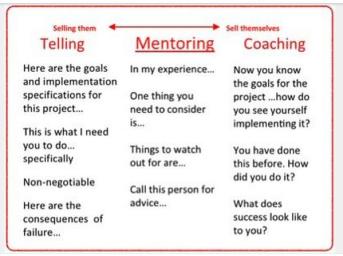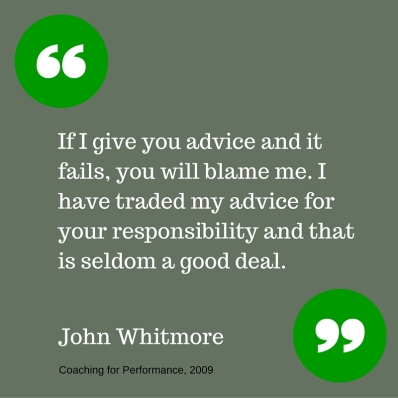The recent #educoachOC chat on Twitter explored the key differences and similarities between coaching and mentoring as strategies to support teacher learning. I might tease out a few of the issues covered in the chat in future posts but for now I’ll concentrate on the issue of advice giving in a coaching or mentoring context.
There was a lot of discussion around the giving of advice versus not giving advice, and the expectations of both parties when entering into a coaching or mentoring relationship.
I liked Mary Jones‘ use of internal v external expertise and Kerron Worsdell‘s “revelation/epiphany” response. A mentoring relationship (not necessarily with the coach) could be an appropriate form of “external” learning that emerges in response to a need identified within a coaching cycle.
Sam Boswell shared the image below. It’s clear that the ownership and responsibility of the coachee increase as we move to the right.
This brought to mind something that was introduced to me during my coaching accreditation training and that I’ve referred to many times since when trying to explain the coaching process.
The know-how continuum can be a helpful way of thinking about how we frame our coaching questions in order for the coachee to generate options for moving forward. Ideally we want to stay, as long as possible, with the coachee’s own context, experiences and successes. Having fully explored this line of enquiry, or if it turns out not to be fruitful territory, we might move along to another – someone else who they know is good at this or has faced similar challenges or is in a similar context to the coachee. Finally, the last stop on the know-how continuum is the coach. The coach will almost certainly have ideas of their own to help the teacher move towards their goal. However, that’s just what they are – the coach’s ideas – and who’s to say that they are the best ideas? At this point, seeing the coachee struggling to find enough options, the coach might ask “would you like some suggestions?“. Caution and restraint are required on the part of the coach at this stage. A “yes please” response is not a license to immediately flip into full directive mode!
The aim is to keep responsibility and ownership with the coachee. Introducing a suggestion with something like “What I’ve seen work in the past is….“, to some degree, puts the idea out there in neutral territory without the coach claiming ownership of it. This is very different from “Well, what I think you should do is…“. For (teacher) coaches (or perhaps just humans in general!) this can be a difficult thing to do. As Whitmore puts it:
It may be harder to give up instructing than it is to learn to coach
In my own experience as a teacher-coach, maintaining faith in the capacity of the coachee, and resisting telling, have at times been the most challenging aspects of the role. The faith is in their ability (supported by the coaching process) to reflect, think deeply, commit and act. It is not necessarily about surfacing specific knowledge or skill (although it may be there). Effective coaching helps the coachee to realise that they have the capacity to find a way to solve the problem or address their need. It is not always about knowing the answer there and then – “know-how” in this context can be knowing how to find their own answers.
So how does this sit with you? What’s your experience as a coach or coachee? What questions would you ask at different points on the know-how continuum? How do designated Instructional Coaches (more common in the US) manage to keep responsibility and ownership with the coachee when operating in a more directive way around specific instructional strategies?
Further Reading:
Mark McKergow discusses the “know-how continuum” as a Solutions Focussed approach in these two great articles:
Manager as coach – gathering know-how for improved performance
Manager as coach – introducing the coach’s know-how Part 2
Thanks to Jason Pascoe (@jpgci) for sharing these.
Reference:
Whitmore, J. (2009). Coaching for performance: GROWing human potential and purpose, the principles and practice of coaching and leadership (4th ed.). London, England: Nicholas Brealey Publishing.






Chris, I totally agree that caution and restraint are required, and difficult to apply, in a coaching conversation. As you say, the coach must maintain their faith in the coachee’s own capacity to reflect and work through their problems of practice.
Thanks for a great post.
Deb
LikeLike
Thanks for taking the time to comment, Deb. I’ve edited the post to include two short articles by Solutions Focus guru Mark McKergow.
LikeLike
I really intrigued about the dilemma that a ‘leader’ who is in charge of making the hard calls cannot wear both hats. So often they do. I guess the reality is that they are not really a coach then.
The other aspect that it has left me thinking about is idea that ‘coaching’ starts long before there is an official meeting. I am left questioning how I speak in the staffroom, online, through my blog. Often I feel this dictates the relationship, the connection and maybe where we place on the ‘Know-How Continuum’
LikeLike
Hello again Aaron, just to respond to your last point about “where we place on the Know-How Continuum” –
It was not really intended as a continuum to place ourselves on but rather “stops” on a line to visit with the coachee during the “options” phase of a coaching conversation.
Without seeing you in action in your role/school I can’t say how you operate but your own “know-how” in relation to digital pedagogies is not in question and I get a sense that you are seen as an advocate and “go-to” person in your school. This is all great – you are allowed to be seen as the expert. What might change is the way you engage with staff who come to you looking to change the way they work with technology in their classrooms. Less fixing/telling/showing and more questioning, awareness raising, action and feedback?
Hang in there!
LikeLiked by 1 person
Hi Aaron, thanks for your comment. I’m glad the post was thought provoking for you.
It is a real challenge for a leader to act as a coach and, at times, an evaluator. Maybe the degree to which this is successful depends on the relationship they already have with the coachee and how they are perceived based on their previous actions and way of being. The coachee needs to be able to trust the coach and be vulnerable. This is very hard if the coach is also their line-manager. Having said this, a leader can make good use of coaching skills and develop a coaching stance in the way they operate. You might say that this is a coaching leadership style rather than being a Coach.
Nearly at my train stop – I’ll respond to your other point later. Thanks,
Chris
LikeLike